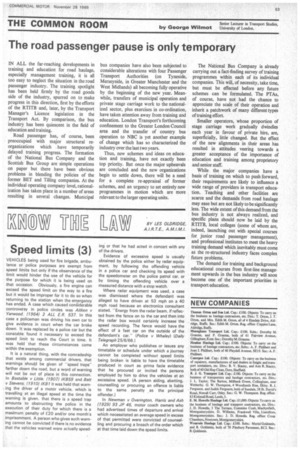The road passenger pause is only temporary
Page 65

If you've noticed an error in this article please click here to report it so we can fix it.
IN ALL the far-reaching developments in training and education for road haulage, especially management training, it is all too easy to neglect the situation in the road passenger industry. The training spotlight has been held firmly by the road goods side of the industry, spurred on to make progress in this direction, first by the efforts of the RTITB and, later, by the Transport Manager's Licence legislation in the Transport Act. By comparison, the bus industry has been quiescent in the field of education and training.
Road passenger has, of course, been preoccupied with major structural reorganizations which have temporarily delayed training progress. The formation of the National Bus Company and the Scottish Bus Group are simple operations on paper but there have been obvious problems in blending the policies of the former BET and Tilling companies. At the individual operating company level, rationalization has taken place in a number of areas resulting in several changes. Municipal bus companies have also been subjected to considerable alterations with four Passenger Transport Authorities (on Tyneside, Merseyside, in Greater Manchester and the West Midlands) all becoming fully operative by the beginning of the new year. Meanwhile, transfers of municipal operation and private stage carriage work to the nationalized sector, plus exercises in co-ordination, have taken attention away from training and education. London Transport's forthcoming confinement to the Greater London Council area and the transfer of country bus operation to NBC is yet another example of change which has so characterized the industry over the last two years.
Thus, new schemes and ideas on education and training, have not exactly been top priority. But once the major upheavals are concluded and the new organizations begin to settle down, there will be a need for a complete re-appraisal of former schemes, and an urgency to set entirely new programmes in motion which are more relevant to the larger operating units. The National Bus Company is already carrying out a fact-finding survey of training programmes within each of its individual companies. This will, of necessity, take time, but must be effected before any future schemes can be formulated. The PTAs, of course, have not had the chance to appreciate the scale of their operation and inherit a patchwork of many different types of training effort.
Smaller operators, whose proportion of stage carriage work gradually dwindles each year in favour of private hire, are, superficially, little changed. But the effect of the new alignments in their areas has resulted in attitudes veering towards a greater acceptance of the importance of education and training among proprietory and senior staff.
While the major companies have a basis of training on which to push forward, their requirements are likely to influence a wide range of providers in transport education. Teaching and other facilities are scarce and the demands from road haulage may ease but are not likely to be significantly less. The wide extent of this demand from the bus industry is not always realized, and specific plans should now be laid by the RTITB, local colleges (some of whom are, indeed, launching out with special courses for junior road passenger management), and professional institutes to meet the heavy training demand which inevitably must come as the re-structured industry faces complex future problems.
The demand for training and background educational courses from first-line management upwards in the bus industry will soon become one of the important priorities in transport education.
















































































































